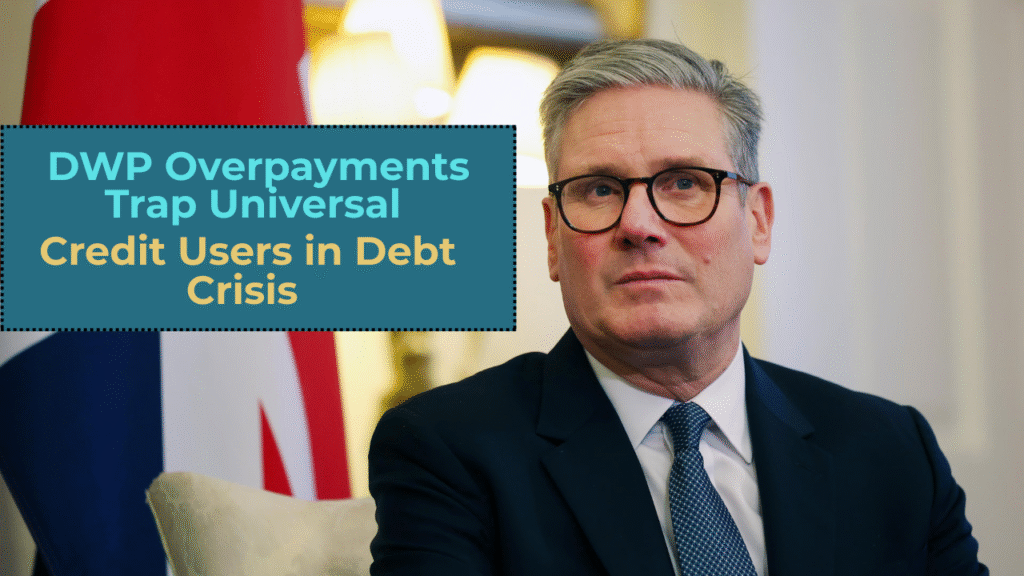Thousands Hit by Department for Work and Pensions’ Mistakes
Tens of thousands of Universal Credit (UC) claimants across the UK have been left repaying vast sums due to overpayment errors made by the Department for Work and Pensions (DWP). Recent figures reveal that in the 2022-23 financial year alone, overpayments caused by DWP’s own mistakes reached a staggering £490 million.
The overpayments, often unnoticed by claimants at the time, are now being clawed back, pushing many vulnerable households deeper into financial hardship during a cost of living crisis.
Overpayments Not the Fault of Claimants
While fraud and claimant errors contribute to some overpayment cases, a significant portion of the debt owed to the government stems from mistakes made by the DWP itself. In 2022-23, 22% of the £2.2 billion in UC overpayments were due to official error amounting to nearly half a billion pounds.
These errors include miscalculations of earnings, administrative oversights, and failures to update systems promptly. Claimants are still expected to repay the full amount, regardless of whether they were at fault.
Growing Debt Burden for Low-Income Households
The DWP typically recovers overpaid benefits by deducting money from future Universal Credit payments, which are already modest and often stretched thin. This has left thousands of households with less financial support each month.
According to the latest government data, the average deduction for Universal Credit claimants repaying debts is approximately £63 per month. For many, this represents a significant portion of their income, especially amid rising costs for energy, food, and housing.
Advocacy groups and charities argue that the system is unfair, punishing people for errors they did not cause.
Charities and MPs Raise Alarm
Anti-poverty organisations such as the Joseph Rowntree Foundation and Citizens Advice have long warned that benefit deductions are pushing struggling families further into crisis. They stress that many claimants cannot afford to lose money each month due to repayment demands resulting from administrative errors.
Alison Garnham, Chief Executive of Child Poverty Action Group, stated:
“It’s unacceptable that low-income families are penalised for mistakes made by the DWP. The government should write off debts caused by its own errors.”
Several MPs have also called for reforms, urging the DWP to reconsider its approach to recouping overpaid benefits. They argue for a fairer system that distinguishes between fraud and honest mistakes especially those made by officials.
DWP Defends Recovery Process
In response to criticism, the DWP maintains that recovering overpaid benefits is necessary to maintain fairness in the welfare system. A DWP spokesperson stated:
“We have a responsibility to the taxpayer to recover overpayments. However, we do so in a way that is affordable for claimants, with safeguards in place to protect vulnerable people.”
Despite this, campaigners point out that many claimants are not informed promptly of overpayments or the reasons behind them, leaving them confused and anxious when repayments begin without warning.
Parliamentary Inquiry Underway
The growing concern around DWP errors and debt recovery has prompted a parliamentary inquiry by the Work and Pensions Committee. The inquiry is examining how overpayments are calculated, communicated, and recovered, and whether the current system is fit for purpose.
In preliminary findings, the committee noted that claimants often have little opportunity to challenge overpayments, especially when they’re not aware that an error occurred. The inquiry is expected to publish full recommendations later this year.
Calls for Reform and Debt Write-Off
There is increasing public pressure for the government to introduce policies that protect claimants from overpayment debts they did not cause. Suggested reforms include:
- Writing off debts caused by official DWP error
- Introducing independent reviews before recovery begins
- Capping monthly deductions at more affordable levels
- Improving communication and transparency in overpayment notices
Campaigners also argue that digital systems used by the DWP need urgent upgrading to prevent recurring errors and ensure real-time updates on claimants’ circumstances.
The Human Cost of Clerical Errors
Behind the statistics are real people facing difficult choices. Numerous claimants have shared stories of being pushed into rent arrears, food bank reliance, and mental health struggles because of unexpected deductions.
Emma, a single mother from Birmingham, said:
“I had no idea I’d been overpaid until I saw £80 missing from my payment. I rang the DWP, but they couldn’t explain properly. I’ve had to cut back on food for me and my son.”
For many, these debts feel unjust, especially when the fault lies not with them, but with the system meant to support them.
Looking Ahead
As Universal Credit continues to be the backbone of the UK’s welfare support system, ensuring its accuracy and fairness is more important than ever. With inflationary pressures ongoing and many households teetering on the edge, campaigners say the time has come for the government to acknowledge and correct the consequences of its own mistakes.
The final report from the parliamentary inquiry, along with ongoing advocacy by civil society groups, may ultimately force the DWP to rethink how it handles overpayment debt especially when it’s the department, not the claimant, that’s at fault.




